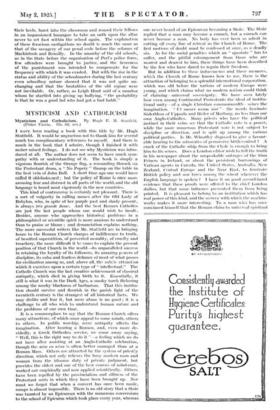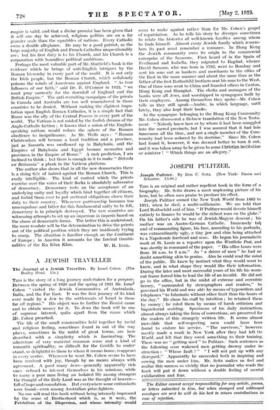MYSTICISM AND CATHOLICISM
Mysticism and Catholicism. By Hugh E. M. Stutfield. (Fisher Unwin. 12s. 6d. net.)
I HAVE been reading a book with this title by Mr. Hugh Stutfield. It would be ungracious not to thank him for several much too complimentary references to myself. And there is much in the book that I admire, though I finished it with rather mixed feelings. I do not see why Mysticism was intro- duced at all. The author does not seem to have much sym- pathy with or understanding of it. The book is simply a vigorous flourish of the Orange flag, a resounding thwack on the Protestant drum, a " No Popery " thump on the table in the best vein of John Bull. A short time ago one would have called it old•fashioned ; but the policy of Rome is once more arousing fear and distrust in all parts of the world, and the old language is heard most vigorously in the new countries.
This kind of controversy is.certainly not pleasant. There is a sort of vulgarity in calling names after the Old Lady of Babylon, who, in spite of her purple past and shady present, is always tres grande dame. And the best Roman Catholics arc just the last people whom one would wish to insult. Besides, anyone who approaches historical problem= in a philosophical or scientific spirit is more anxious to understand than to praise or blame ; and denunciation explains nothing. The more successful writers like Mr. Stutfield are in bringing home to the Roman Church charges of indifference to truth, of besotted superstition, of perverted morality, of cruelty and treachery, the more difficult it tr, Fumes to explain the present position of that Church in the world—its unparalleled success in retaining the loyalty of its followers, its amazing pawers of discipline, its calm and fearless defiance of most of what passes for civilization among us, and, above all, the subtle attraction which it exercises upon a certain type of " intellectual." The Catholic Church was the last creative achievement of classical antiquity, which died in giving birth to it. Essentially, it still is what it was in the Dark Ages, a smoky torch flickering among the murky blackness of barbarism. That this institu- tion should survive and flourish in the garish light of the twentieth century is the strangest of all historical facts. We may dislike and fear it, but mere abuse is no good ; it is a challenge to all who wish to understand human nature and the problems of our own time.
It is a commonplace to say that the Roman Church offers many attractions, of which some appeal to some minds, others to others. In public worship, mere antiquity affects the imagination. After hearing a Roman, and, even more de- cidedly, a Greek Orthodox service, we come away saying, " Well, this is the right way to do it "—a feeling which we do not have after assisting at an Anglo-Catholic celebration, though the mise en scene is often better managed than at a Roman Mass. Others are attracted by the system of priestly direction, which not only relieves the busy modern man and woman from the irksome duty of private judgment, but provides the oldest and one of the hest courses of mind-cure, worked out empirically and now applied scientifically. Others have been repelled by the provincialism and silliness of the Protestant sects in which they have been brought up. Nor must we forget that when a convert has once been made, escape is almost impossible. There is an old story that a Stoic was taunted by an Epicurean with the numerous conversions to the school of Epicurus which took place every year, whereas
one never heard of an Epicurean becoming a Stoic. The Stoic replied that a man may become a eunuch, but a eunuch can never become a man. No body has ever been so adroit in cutting off every line of retreat as the Church of Rome. The first motions of doubt must be confessed at once, as a deadly sin. As for the social penalties which an " apostate " has to suffer, and the pitiful estrangement from those who are nearest and dearest to him, these things have been described by the few who have dared to regain their freedom.
But in addition to these inducements and these menaces, which the Church of Rome knows how to use, there is the attraction of belonging to a splendid international corporation, which was old before the nations of modern Europe were young, and which claims what no modern nation could think of claiming—universal sovereignty. We have seen lately how even among Continental Protestants the ideal of institu- tional unity—of a single Christian conunonwealth—seizes the imagination. " Ut omnes union sins "--the words fascinate Soderblom of Uppsala and Heiler of Marburg, no less than our own Anglo-Catholics. Many priests who have the political instinct in their veins sec that the Catholic vote is a power, while the more numerous Protestant vote is not subject to discipline or direction, and is split up among the various political parties. Is Mr. 1Vheatley disposed to give a favour- able hearing to the advocates of permissive birth-control ? A crack of the Catholic whip from the Clyde is enough to bring him to his senses. Does a London editor wish to tell the truth in his newspaper about the unspeakable outrages of the Sinn Feiners in Ireland, or about the persistent borrowings of Vatican agents in Canada, the United States, Australia, New Zealand, Central Europe and the Near Nast, to frustrate British policy and sow tares among the wheat wherever the English language is spoken ? I have it on good second-hand evidence that these proofs were offered to the chief London dailies, but that some influence prevented them from being printed. It is pleasant to belong to an institution which has real power of this kind, and the secrecy with which the machine works makes it more interesting. To a man who has once convinced himself that the Roman claim to universal spiritual
empire is valid, and that a divine promise has been given that it will one day be achieved, religious politics are on a far grander scale than the squabbles of nations. Every Catholic owns a double allegiance. He may be a good patriot, as the large majority of English and French Catholics unquestionably are ; but his first duty is to his Church, and his Church is a corporation with boundless political ambitions.
Perhaps the most valuable part of Mr. Stutlield's book is the evidence which he brings of anti-English intrigues by the Roman hierarchy in every part of the world. It is not only the Irish people, but the Roman Church, which sedulously poisons the minds of Americans against England. " As true followers of our faith," said Dr. B. O'Connor in 1923, " we must pray earnestly for the downfall of England and the British Empire." The anti-recruiting campaigns of the priests in Canada and Australia arc too well remembered in those countries to be denied. Without making the slightest impu- tation upon English Roman Catholics, it is a simple fact that Rome was the ally of the Central Powers in every part of the world. The Vatican is not misled by the foolish dreams of the Anglo-Catholic faction ; it knows that a union of the English- speaking nations would reduce the sphere of the Roman obedience to insignificance. As Mr. Wells says : " Roman Christendom will become a local tradition and a province, just as Samaria was swallowed up in Babylonia, and the Empires of Babylonia and Egypt became memories and provinces in the Empire of Rome." A rash prediction, I am inclined to think ; but there is enough in it to make " Delenda est Britannia" a plank in the Vatican platform.
The author also shows that in all the new democracies there is a rising tide of hatred against the Roman Church. This is easily intelligible. The kind of control which the priests exercise over the votes of their flocks is absolutely subversive of democracy. Democracy rests on the acceptance of an underlying unity and loyalty which bind together all citizens, and forbid them ever to put sectional obligations above their duty to their country. Whenever partisanship becomes too unscrupulous and bitter for this fundamental unity to be felt, democracy is in principle destroyed. The new countries are witnessing attempts to set up an imperium in imperio based on the abuse of democratic. forms. The better this is understood, the more resolute will be the determination to drive the priests out of the political position which they are insidiously trying to usurp. The situation is familiar enough on the Continent of Europe ; in America it accounts for the farcical theatri-











































 Previous page
Previous page